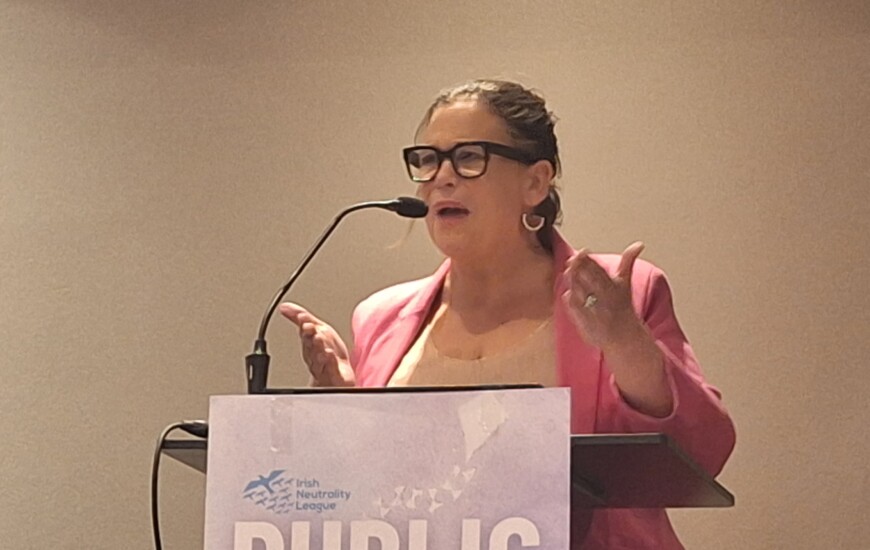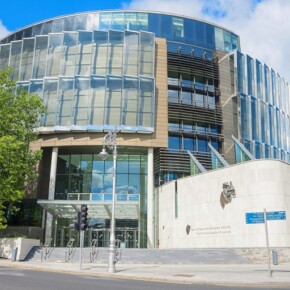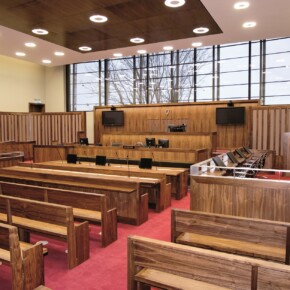Opposition goes to war over neutrality
Mike Finnerty 22 May 2025
A sunny Saturday afternoon in May conjures up images of backyard BBQs, ice cream, sports playing on the TV or radio and an overall cheery mood.
The mood downstairs in the Gresham Hotel on a Saturday afternoon is anything but; a sense that Ireland’s neutrality is under very real threat.
Since the government was formed in January, the government parties have announced planned changes to the Triple Lock, with the justification that Russia has a veto on the United Nations Security Council.
The changed geopolitical landscape of the 2020s, which has seen wars in Ukraine and Gaza dominate headlines, a highly erratic second Trump term, along with attempted coups in Brazil and South Korea, paints an image of an unstable, volatile world.
This charged geopolitical climate, the government argues, is the context necessary for a shift in Ireland’s foreign policy and moving away from the historic policy of neutrality.
Speaking in March, Tánaiste Simon Harris said, “under our current triple lock system, countries like Russia have the power to veto Ireland’s participation in missions via their role as permanent members of the UN Security Council.”
“We don’t believe that Putin or other leaders should have a veto on whether our troops can be deployed,” he said.
Fine Gael has always shown an internationalist streak whenever they are in charge of foreign affairs, but Fianna Fáil’s change of heart on the issue appears to be borne of their newfound partnership with Fine Gael.
As recently as 2013, Taoiseach Micheál Martin said that the “Triple Lock is at the very core of our neutrality.”
That quote has come back to haunt the Taoiseach in recent weeks, but it can also be argued that the global order of 2013 is very different to the one in 2025.
In 2012, the Bulletin Of Atomic Scientists placed the Doomsday Clock at five minutes to midnight; the most recent January 2025 update placed it at 89 seconds.
The Programme for Government, which was agreed upon in January, reads “the government will preserve and protect Ireland’s policy of active military neutrality. We also recognise that while we strongly value our military neutrality, we are not politically neutral. We will continue to engage with international partners, and we will reform the Triple Lock legislation.
On the other side of the coin, there is strong opposition to any changes to the Triple Lock.
A veritable who’s who of the opposition parties were present at the event (with Labour, pointedly, not turning up) and Dublin was well represented by politicians such as Mary Lou McDonald, Frances Black, Paul Murphy and Sinéad Gibney on the day.
There were some murmurings among the crowd that no elected representative from Labour was scheduled to speak at the event, but Labour has stated in recent weeks that they are for the retention of the Triple Lock and would look to engage with the Irish Neutrality League on the campaign going forward.
Among the crowd, grey haired men who most likely protested American foreign policy excesses in the 60s and 70s were in attendance, as were younger people in their 20s with man buns and nose rings, a college student wearing a “Capitalism Still Really Sucks” t-shirt and an acoustic guitar was set up near the podium, prominently placed near a Gaza flag.
In other words, it was the kind of event designed to make Fine Gael members and opinion writers at national broadsheets break out in a cold sweat.
Senator Frances Black said the issue is neutrality is not just political, it was also personal.
She called the recent government stance on the issue an “unacceptable erosion” and said that “we know the people support our campaign.”
The independent Senator expressed the fears shared by many in the crowd; that humanity is at a turning point.
The Dublin Senator opted to strike a hopeful tone, saying, “peace can and will prevail.”
The Vietnam War was described by sociologists and political scientists as the first war to be broadcast to the living room; now, the war in Gaza can be seen as the first war to be livestreamed from someone’s phone.
Black’s tone looked to take the tension and emotion around the issue down a bit.
“It is up to us now to choose a path of peace,” she said.
People Before Profit TD Paul Murphy warned that the government would use its majority to “ram” changes through, and that mass protests were needed to combat them.
In March, Murphy stated, “the government don’t want you to understand the Triple Lock,” and how they are banking on public disillusionment to change the law.
The mid-May launch is a prelude to what Sarah O’Rourke of the Irish Neutrality League hopes to be part of a larger civic movement, similar to the Together For Yes campaign of 2015 and the Repeal campaign in 2018.
In mid-June, a protest will take place in Dublin City Centre, and Sinn Féin leader Mary Lou McDonald said that the movement should the movement will “fight like hell” to protect Ireland’s neutrality.
McDonald joined Social Democrats’ then-foreign affairs spokesperson Sinéad Gibney in challenging the government to put the proposed changes to a referendum.
In the time since this article appeared in print, Gibney was replaced as the Soc Dems’ foreign affairs spokesperson, with Senator Patricia Stephenson replacing her.
In recent weeks, Gibney has invoked the spirit of the Nice and Lisbon referendums as proof that Ireland has received assurance from the EU that it would not be drawn into any militarisation plans, and the wishes of the electorate should be respected.
Indeed, it was Gibney who first floated the idea of putting any changes to the Triple Lock to a referendum, as reported in a Southside People lead story in March, with her calls now being backed by McDonald.
McDonald stated, “our message to Micheál Martin, Simon Harris and Ursula Von der Leyen is clear – hands off Irish neutrality.”
She said that the concept of neutrality is “hardwired” into Ireland’s collective identity, and the recent geopolitical tensions are a reminder of why neutrality is more important.
“We will not give up on the United Nations peacemakers who have represented us with pride,” she stated.
“If Micheál Martin and Simon Harris are so confident that their shameful plan has public support, then they should put it to the people in a referendum,” she said, closing out her speech.
“Let the people have their say, and they will get their answer loudly and clearly. That answer will be – hands off Ireland’s neutrality,” she predicted.
For his part, Harris expressed disappointment over the Irish Neutrality League’s stance and with the opposition for attending the event.
“What would the opposition propose we do if the UN didn’t renew the mandate for our peacekeepers in Lebanon?” he posited.
“We cannot allow others to have a veto over where we send Irish peacekeepers.”
Whatever the outcome of the neutrality debate, one thing has become clear; the war over Ireland’s neutrality will become one of the burning issues of this government’s term.











